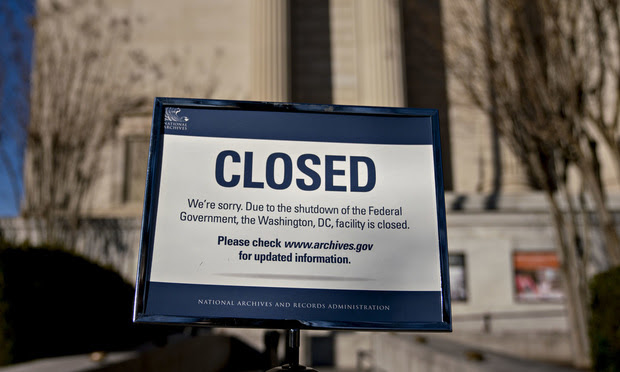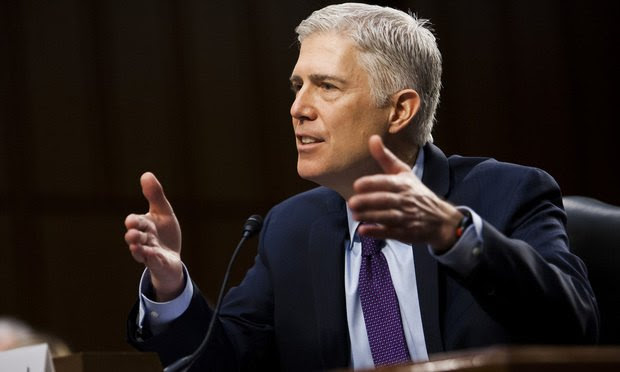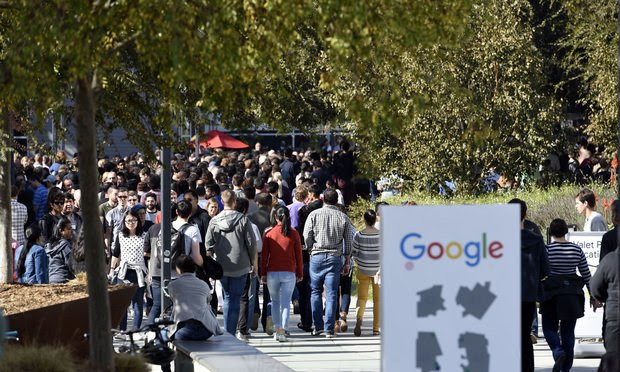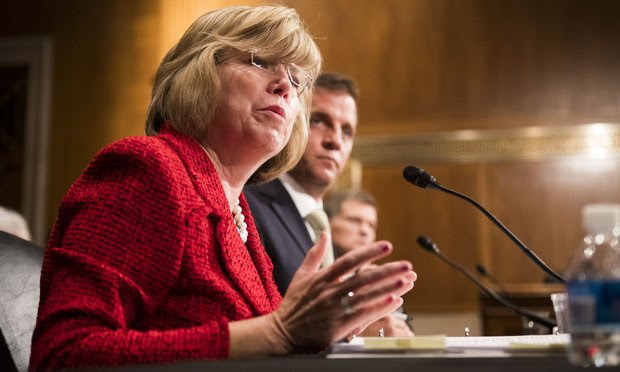Labor of Law: Shutdown Sails On, Suits Pile Up | SCOTUS Takes Bias Case | Plus: Shareholder Suit Against Google, Who Got the Work & More
The labor and employment considerations as Trump's partial government shutdown drags on. Plus: the Supreme Court's taken a new bias case—and we got a ruling that went against arbitration. Trump's renominated Janet Dhillon to the EEOC, Citigroup released pay data, and much more below. Thanks for reading!
January 17, 2019 at 12:00 PM
11 minute read
Welcome to Labor of Law. The nation's longest shutdown in history drags on and employers are looking out for ripple effects. Plus: the Supreme Court's labor-and-employment docket grew—and we got a pro-worker ruling in an arbitration case. And more: Trump's renominated Janet Dhillon to the EEOC; Goldberg Segalla reached a settlement with the NLRB; and Citigroup releases pay data. Scroll down for notable moves and who got the work. Thanks for reading!
Shutdown Drags On, With Broad Implications
The end to what is now nation's longest federal government shutdown seems nowhere in sight. The partial shutdown has forced hundreds of thousands of workers to stay at home—or be required to report for duty, unpaid.
Lawsuits are mounting in the U.S. District Court for the District of Columbia and in the U.S. Court of Federal Claims, where class actions seek back pay, overtime and other damages. A federal judge in Washington this week refused to allow “essential” federal workers to remain at home during the impasse.
More agencies, including the U.S. Department of Agriculture and the IRS, are calling furloughed employees into work to process certain claims, including tax refunds.
A Fisher Phillips client advisory warned: “While the peculiarities of the federal budget process meant that this shutdown started out by not hitting the nation's employers as hard as prior shutdown events, the lingering nature of the event has started to take its toll, and things could get much more difficult in just a few short days.”
>> What are federal employees doing during the shutdown? Some federal workers are pulling money out of retirement accounts, according to Bloomberg. Others reportedly have turned to Uber and Lyft to make money on the side. Forbescited this week a 2016 study that showed 63 percent of Americans don't have enough saving to cover a $500 emergency. Meanwhile, the number of federal workers asked to report to work unpaid has increased, Politico reports. These employees include thousands of aviation safety inspectors, food, drug and medical inspectors and tens of thousands of Internal Revenue Service employees.
>> Can the government force unpaid labor? That's the question raised in a variety of lawsuits in Washington's federal trial court, where U.S. District Judge Richard Leon held a temporary restraining order hearing Tuesday. Leon, presiding over suits from federal labor unions and individual employees, turned down a request for such an order—saying that such an order would have caused chaos and confusion. Check out my full report here. Leon will hold a fuller hearing later this month—and maybe by then the shutdown will be over. Still, there are lots of suits piling up in the U.S. Court of Federal Claims, including two new ones filed Tuesday from Interior and Customs employees. These cases could drag on for awhile—they are potentially class actions. Why don't federal employees walk off the job? The New York Times raised that question—and provided a few reasons answering it: Federal law prohibits strikes, and government workers generally believe in their mission.
>> Does the shutdown have broader reach? Yes. Ford Harrison partner Gordon Berger said in a recent advisory that the Labor Department had been fully funded and will remain operational. “It will still engage in employer audits and wage and hour investigations, as well as litigation. However, some courts have suspended all litigation where the U.S. government is party,” he wrote. Fisher Phillips pointed out that the judiciary is set to run out of money—an “impending nightmare,” in the firm's view. The courts said this week they expect paid-operations to continue at least until Jan. 25. Once that money runs out, civil litigation will likely take a backseat. “For those employers who have upcoming trials scheduled, there is a chance that the case could be indefinitely postponed at the last minute. For those cases that proceed to trial, there is a chance that the jurors may not be receiving pay, which might lead to some interesting courtroom dynamics,” the firm said in an advisory.
SCOTUS Takes Labor Case, Turns on Arbitration
The U.S. Supreme Court this term will take up the workplace bias case Fort Bend County, Texas v. Davis. The dispute is procedural, focusing on “exhaustion” and whether all discrimination claims within a suit must be pleaded at the U.S. Equal Employment Opportunity Commission.
Hogan Lovells partner Neal Katyal is counsel to Fort Bend County. In his petition, Katyal framed the question this way: “Whether Title VII's administrative exhaustion requirement is a jurisdictional prerequisite to suit, as three circuits have held, or a waivable claim-processing rule, as eight circuits have held.”
Fort Bend is challenging a ruling from the Fifth Circuit, which sided with Lois Davis, a former IT specialist who alleged religious discrimination. Davis is represented by Raffi Melkonian of Houston's Wright Close & Barger.
“Since the majority of courts do not consider this a jurisdictional requirement, it would be interesting to know if lots of plaintiffs bypass filing administrative charges in those jurisdictions,” Carolyn Wheeler, senior counsel at Washington's Katz, Marshall & Banks told me. “I would doubt it because most lay people would rather file a charge (which is free of cost) than a lawsuit. And anyone with a lawyer would know they need to exhaust administrative remedies as a condition precedent, even if it is not a jurisdictional requirement.”
Meanwhile, the justices issued an employment arbitration ruling that is sure to get more attention. In New Prime Inc v Oliveira, Justice Neil Gorsuch wrote the unanimous ruling. The justices held that a court should decide whether an exception to the federal arbitration law applies before arbitration can proceed, my colleague Tony Mauro reported.
Gorsuch said the words of the Federal Arbitration Act should be interpreted in the way the words meant when the law was enacted in 1925. Theodore Boutrous of Gibson, Dunn & Crutcher represented New Prime in the case. The decision was a win for Public Justice staff attorney Jennifer Bennett, who argued the case on behalf of Dominic Oliveira, a New Prime truck driver.
Michael Droke, labor and employment attorney with Dorsey & Whitney, says, “Justice Gorsuch's decision emphasizes the literal statutory interpretation of the court. The opinion repeatedly emphasized the importance of sequencing decisions: Does the FAA apply, or is this agreement exempt? Only if the answer is 'yes' will the court force the case to arbitration. The court refused to follow the strong public policy favoring arbitration in the face of direct statutory language of an exclusion for workers engaged in interstate commerce.”
Who Got the Work
>> “Recent shareholder lawsuits against Google parent company Alphabet Inc. mark the latest of a new approach in tackling sexual harassment allegations in the #MeToo era,” my colleague Ian Lopez reports at Law.com. Cohen Milstein Sellers & Tollbrought one of the suits last week in California state court. Julie Reiser, a Cohen Milstein partner, said a derivative suit can be “an effective tool” to make sure companies follow employment laws, but there are hurdles. “For sexual harassment lawsuits, the history was very bleak in terms of trying to hold a company's board of directors accountable,” Reiser said. ''One of the things that is frequently missing in the conversation is the fact that sexual harassment is a violation of employment discrimination laws.” Reuters has more here.
>> A federal judge in Pennsylvania has ruled that a transportation company can be held liable for failing to stop an employee from being repeatedly harassed by a non-employee. Read the ruling from U.S. District Judge Jan DuBois here. Hewitt's represented by Samuel Wilson of Derek Smith Law Group, and Daniel Johns of Ballard Spahr represents Sunoco.
>> In the U.S. District Court for the Eastern District of Pennsylvania, Judge Timothy Rice issued a partial summary judgment for Alison Ray, a former AT&T employee that found the company's release agreement violates federal age discrimination laws. The AARP weighed in on the case as an amicus. Paul Hastings represented AT&T. A team from Console Mattiacci Law in Philadelphia represents Ray. Read Rice's judgment here.
>> Cheryl Williams and Kevin Cochrane of California's Williams & Cochrane LLPrepresent tribal-owned Casino Pauma in a new petition at the U.S. Supreme Court. They are challenging a Ninth Circuit ruling that said the California casino violated federal labor law by meddling with a union's recruitment. The case tests Native American sovereignty and the reach of the National Labor Relations Act.
Notable New Hires and Announcements
>> Seyfarth Shaw hired labor economist Christopher Haan to the labor and employment department and the firm's organizational strategy and analytics group. Haan brings more than 18 years of litigation consulting experience. Read the firm's announcement here. Seyfarth also named Diane Dygert as the chair of the employee benefits and executive compensation department. Dygert, a partner in the firm's Chicago office, focuses on health and welfare plans compliance.
>> Former Husch Blackwell attorney Michael Taibleson, who has nearly 30 years of experience advising on compensation and benefits, has joined the Jackson Lewisoffice in Milwaukee as a principal.
>> Charles O. Thompson has moved to Greenberg Traurig as a shareholder in the firm's global labor and employment practice. Thompson was formerly managing partner of Polsinelli's San Francisco office and chair of its class action practice.
>> Morrison & Foerster brought on two new partners, Ann Becchina and Ron Aizen, for its executive compensation and ERISA Group in New York. Both join the firm from Davis Polk.
>> Daniel Lula joined Baker Hostetler's Costa Mesa office. He was previously at Payne & Fears LLP, where he had served as chair of the business litigation group.
Around the Water Cooler
>> President Trump on Wednesday renominated Janet Dhillon to the EEOC, and Sharon Gustafson as EEOC general counsel. Absent on the list: Daniel Gade, who withdrew from consideration last year. Meanwhile, Democratic EEOC member Chai Feldblum, whose renomination Republicans blocked, says she will not pursue another term.
>> The Am Law 200 firm Goldberg Segalla has reached a settlement with the National Labor Relations Board over alleged workplace violations, according to Above the Law, which posted a flyer the firm was required to display. A team from Jackson Lewis represented the firm, and Connecticut lawyer Anthony Interlandi filed the labor challenge. Above the Law reported: “Pursuant to a settlement with the NLRB, the 28 office firm had to put out a flashy disclaimer walking back their confidentiality agreement and reminding employees that they have basic labor rights and that, no, they will not be enforcing the confidentiality agreement they made everyone sign.”
>> A push for giving employees the right-to-disconnect from work after clocking out is gaining traction, most notably in Europe, where for the last decade or so there has been a gradual and growing push to separate personal life from business. In response to the trend, software companies, including workplace communications platforms such as Slack and Speakap, are offering “Do Not Disturb” features for users. [Law.com]
>> A federal judge in San Francisco found that former Ogletree Deakins shareholder Dawn Knepper, who is pursuing gender discrimination claims against the firm, did not opt out of the firm's arbitration agreement. [The Recorder]
>> “Citigroup revealed a “raw,” unadjusted—and unflattering—figure Wednesday showing that median pay for women is 29 percent less than it is for men at the global financial services giant, becoming the first U.S. company to agree to disclose its median pay gap on a global level.” [The Washington Post]
>> In a twist on the argument that sexual orientation should be covered under Title VII, a heterosexual woman said she was treated unfairly by her boss because of her orientation. During oral arguments in the Fifth Circuit, an appeals court judge said she wasn't convinced this claim should be addressed here, bluntly arguing that Title VII does not empower people to be “jerks.” [Texas Lawyer]
>> Can employees speak with the media without prior approval from their boss? A white paper from the University of Florida delves into the question and how much freedom of speech laws extend to workers and the media. [Poynter]
I'm Erin Mulvaney in Washington, covering labor and employment from the Swamp to Silicon Valley. Follow this weekly newsletter for the latest analysis and happenings. If you have a story idea, feedback or just want to say hi, I'm at [email protected]and on Twitter @erinmulvaney.
This content has been archived. It is available through our partners, LexisNexis® and Bloomberg Law.
To view this content, please continue to their sites.
Not a Lexis Subscriber?
Subscribe Now
Not a Bloomberg Law Subscriber?
Subscribe Now
NOT FOR REPRINT
© 2025 ALM Global, LLC, All Rights Reserved. Request academic re-use from www.copyright.com. All other uses, submit a request to [email protected]. For more information visit Asset & Logo Licensing.
You Might Like
View All
Labor of Law: As Workers Suffer With Long Covid, Employers May Rethink Accommodations for Other Disabilities

Labor of Law: Federal Noncompete Ban Would Be Far From Last Word on Issue
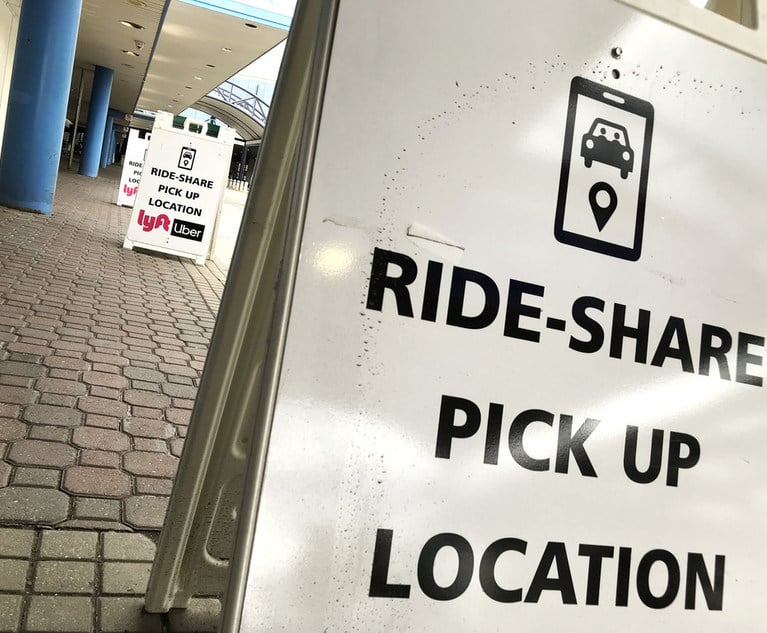
Labor of Law: New Federal Rule Could Upend State Efforts to Count Ride-Share Drivers as Contractors

Labor of Law: Employer Statements on Abortion Could Spur Discrimination, Hostile Work Environment Claims
Trending Stories
- 1'It's Not Going to Be Pretty': PayPal, Capital One Face Novel Class Actions Over 'Poaching' Commissions Owed Influencers
- 211th Circuit Rejects Trump's Emergency Request as DOJ Prepares to Release Special Counsel's Final Report
- 3Supreme Court Takes Up Challenge to ACA Task Force
- 4'Tragedy of Unspeakable Proportions:' Could Edison, DWP, Face Lawsuits Over LA Wildfires?
- 5Meta Pulls Plug on DEI Programs
Who Got The Work
Michael G. Bongiorno, Andrew Scott Dulberg and Elizabeth E. Driscoll from Wilmer Cutler Pickering Hale and Dorr have stepped in to represent Symbotic Inc., an A.I.-enabled technology platform that focuses on increasing supply chain efficiency, and other defendants in a pending shareholder derivative lawsuit. The case, filed Oct. 2 in Massachusetts District Court by the Brown Law Firm on behalf of Stephen Austen, accuses certain officers and directors of misleading investors in regard to Symbotic's potential for margin growth by failing to disclose that the company was not equipped to timely deploy its systems or manage expenses through project delays. The case, assigned to U.S. District Judge Nathaniel M. Gorton, is 1:24-cv-12522, Austen v. Cohen et al.
Who Got The Work
Edmund Polubinski and Marie Killmond of Davis Polk & Wardwell have entered appearances for data platform software development company MongoDB and other defendants in a pending shareholder derivative lawsuit. The action, filed Oct. 7 in New York Southern District Court by the Brown Law Firm, accuses the company's directors and/or officers of falsely expressing confidence in the company’s restructuring of its sales incentive plan and downplaying the severity of decreases in its upfront commitments. The case is 1:24-cv-07594, Roy v. Ittycheria et al.
Who Got The Work
Amy O. Bruchs and Kurt F. Ellison of Michael Best & Friedrich have entered appearances for Epic Systems Corp. in a pending employment discrimination lawsuit. The suit was filed Sept. 7 in Wisconsin Western District Court by Levine Eisberner LLC and Siri & Glimstad on behalf of a project manager who claims that he was wrongfully terminated after applying for a religious exemption to the defendant's COVID-19 vaccine mandate. The case, assigned to U.S. Magistrate Judge Anita Marie Boor, is 3:24-cv-00630, Secker, Nathan v. Epic Systems Corporation.
Who Got The Work
David X. Sullivan, Thomas J. Finn and Gregory A. Hall from McCarter & English have entered appearances for Sunrun Installation Services in a pending civil rights lawsuit. The complaint was filed Sept. 4 in Connecticut District Court by attorney Robert M. Berke on behalf of former employee George Edward Steins, who was arrested and charged with employing an unregistered home improvement salesperson. The complaint alleges that had Sunrun informed the Connecticut Department of Consumer Protection that the plaintiff's employment had ended in 2017 and that he no longer held Sunrun's home improvement contractor license, he would not have been hit with charges, which were dismissed in May 2024. The case, assigned to U.S. District Judge Jeffrey A. Meyer, is 3:24-cv-01423, Steins v. Sunrun, Inc. et al.
Who Got The Work
Greenberg Traurig shareholder Joshua L. Raskin has entered an appearance for boohoo.com UK Ltd. in a pending patent infringement lawsuit. The suit, filed Sept. 3 in Texas Eastern District Court by Rozier Hardt McDonough on behalf of Alto Dynamics, asserts five patents related to an online shopping platform. The case, assigned to U.S. District Judge Rodney Gilstrap, is 2:24-cv-00719, Alto Dynamics, LLC v. boohoo.com UK Limited.
Featured Firms
Law Offices of Gary Martin Hays & Associates, P.C.
(470) 294-1674
Law Offices of Mark E. Salomone
(857) 444-6468
Smith & Hassler
(713) 739-1250



